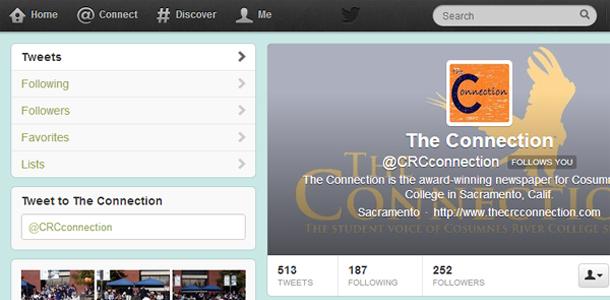A pair of bills signed by Gov. Jerry Brown in Sept. 2012 went into effect on Jan. 1, prohibiting colleges and employers from demanding social media information from employees or students.
The two bills, California Senate Bill 1349 and California Assembly Bill 1844, provide legal protection for the privacy of social media users of outlets such as Facebook, Twitter or Tumblr from their employers or secondary education institutions requesting or requiring private social media information. As such, the laws affect many Cosumnes River College students that use social media.
“If it’s true that as a prospective student or employee these bills make it illegal for my school or my employer to demand that I share my login information, it protects my privacy, which is what I have as a citizen, and I think that should override any other status I have,” said CRC Distance Education Coordinator Gregory Beyrer. “I’m a citizen first, before I’m a student or employee.”
SB1349 effectively prohibits any secondary education institution or employer from requiring or requesting a student or employee to “disclose the user names or account password for a personal social media account” or “provide the institution or employer with access to any content of the account,” according to the Bill Analysis on the California State webpage.
Like SB1349, AB1844 prohibits companies from requesting or requiring social media from employees, but more importantly, it defines “social media” as “an electronic service or account, or electronic content” which includes “videos, still photography, blogs, video blogs, podcasts, instant and text messages, email, online services or accounts, or internet website profiles or locations,” according to the Bill Analysis on the California State webpage.
Some students are glad that employers and universities can no longer request personal social media information.
“I feel safer,” said Seraiah Lacey, a 20-year-old business major. “I feel like that should be private because that’s your own private life and your work or your school shouldn’t be a part of that.”
While Facebook often functions as a public forum, it is often regarded as an aspect of private life, separate from work or school.
“If I want to say whatever I want to say on Facebook, I shouldn’t have to worry about that coming out at work,” Lacey said.
While privacy from employers and schools is important to many CRC students, some suggested that a lack of discretion on the part of social media users was also part of the problem.
“I’m completely for the fact that it’s not their business,” said Jordan Merical, a 20-year-old business and social media major. “But if you’re putting your business out on a social media website, it’s your fault.”
Professor Beyrer also suggested that employers might not just be concerned with what their employees are posting, but what the act of posting it means.
“Let’s say there’s someone who does something silly and gets put on Facebook and their prospective employer finds out about it and says ‘I don’t want to hire him,’ it could be two things, he did something stupid, or that he’s willing to share something stupid, because then he might be willing to share the company’s information publicly.”

